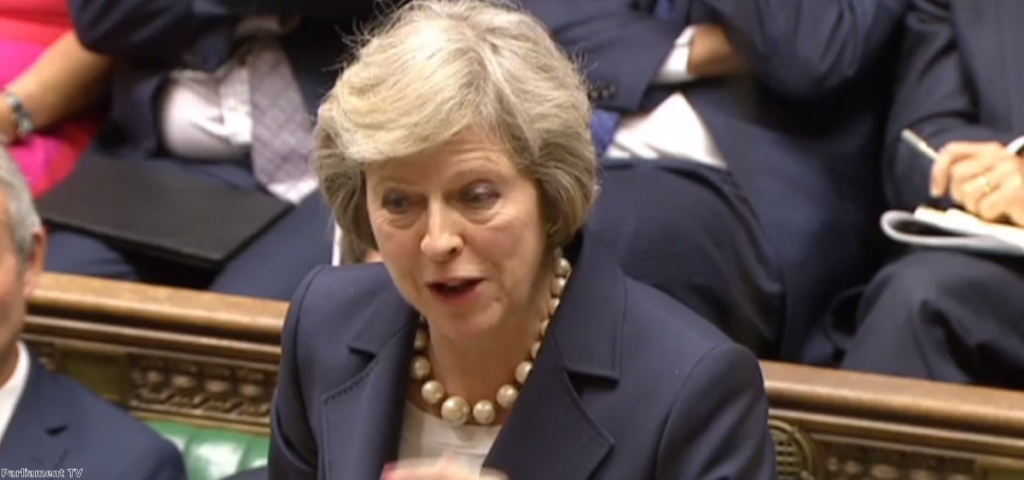She looked like she'd been doing it for years. From her first words to her last, Theresa May appeared supremely comfortable leading PMQs. It was effortless. Terrifyingly so. It was hard to shake the feeling she'd be doing it well into the future.
Certainly she'll have no problem beating Jeremy Corbyn, although that is not a high bar to set. Even if he was better at PMQs, the catastrophe which is the Labour party means opposing him is like shooting fish in a barrell. And the benches behind the opposition leader are so nakedly critical of him that it's hard to imagine him ever being able to muster any confidence or momentum in these exchanges.
But even if Corbyn was much better, I suspect May would still have excelled here. She found the right tone and words – specific, but without getting dragged down into technical language, as Corbyn tends to do. She projected a sense of competence and sturdy government in a period of sudden change.
It was also refreshing to have a change from David Cameron's easy bluster and evasion. May's answers were concrete, full of content, specific. There was more substance here and less flash.


But everything pales in comparison to May's Thatcher moment. It was astonishing. Like some ghostly possession, the spirit of Maggie was suddenly within her.
This bit from #PMQs was just brutal pic.twitter.com/P1b1rHlSh3
— Sunny Hundal (@sunny_hundal) July 20, 2016
"It's interesting that he refers to the situation of some workers who might have some job insecurity and potentially unscrupulous bosses," she said. "I suspect that there are many members on the opposition benches who might be familiar with an unscrupulous boss. A boss who doesn't listen to his workers, a boss who requires some of his workers to double their workload and maybe a boss who exploits the rules to further his own career."
Jokes don't come easily to her. She couldn't hide the fact that they'd been written for her. But she managed to get them out with relative ease. It was passably funny.
And then it came. Like a scene in an M Night Shyamalan film. Maggie rose from out the grave, sought out a host body in the form of the new prime minister, and spoke out.
"Reeeeemind him of anybody?" she asked, in that oddly screechy baritone Thatcher would use.
A shiver travelled up my spine and stayed there. It may never leave. It was like the final scene in a slasher film where the kids think they've fought off the antagonist, only for them to suddenly turn up for one more round. You thought you got rid of her? Well think again.
It made it hard to shake the feeling that, like Thatcher, May will be sat in Downing Street for years. And why not? She could hold an election tomorrow, or as planned in 2020. If it's Corbyn standing against her, she'll win. She'll probably win whoever is standing against her.
Away from the theatrics, Tory MP Edward Leigh asked a question about the single market. The answer was more important than anything else which was said today, although it will obviously be overshadowed by the resurrection of Maggie moments earlier. He wanted the prime minister to say we'd be leaving the single market. May refused to do so. Yes, there needed to be "controls on free movement" but we also needed "the right deal on trade". That was as reassuring a message as we've heard from her that the UK would be staying in the single market, despite chancellor Phillip Hammond's confused statements earlier this week. Even the phrase 'controls of', rather than 'the end of' suggests she will be pursuing a moderate strategy in Europe.
Now May holds her first meeting with Angela Merkel this afternoon. It is far more important than anything happening in Westminster. Cameron always thought he had Merkel wrapped around his little finger, but, like Blair and Bush, he had overestimated his influence and came back from his renegotiation empty handed. Merkel may well prefer May’s careful, policy-orientated, unflashy style. If so, that relationship could spark some much needed goodwill from the continent and prove to be decisive in the years ahead.
May won the Commons without breaking a sweat. Now she must win over the Germans. That could prove a more challenging task.
Ian Dunt is the editor of Politics.co.uk
The opinions in politics.co.uk's Comment and Analysis section are those of the author and are no reflection of the views of the website or its owners









